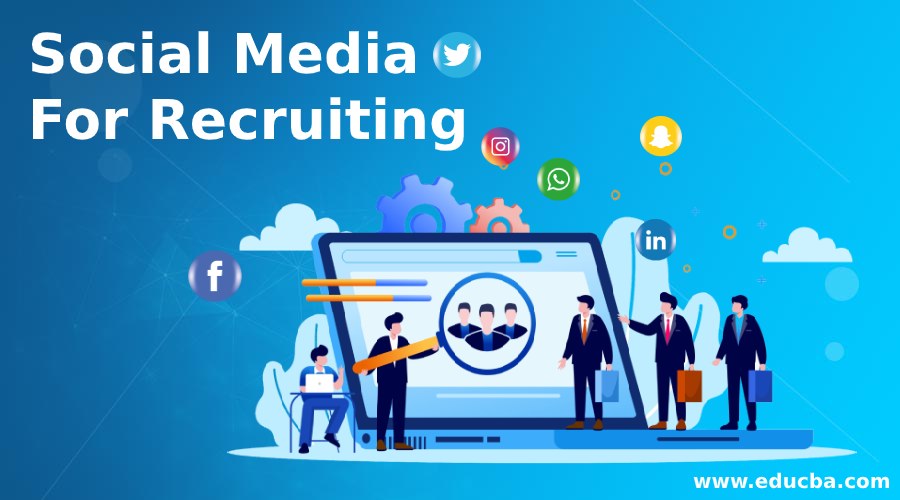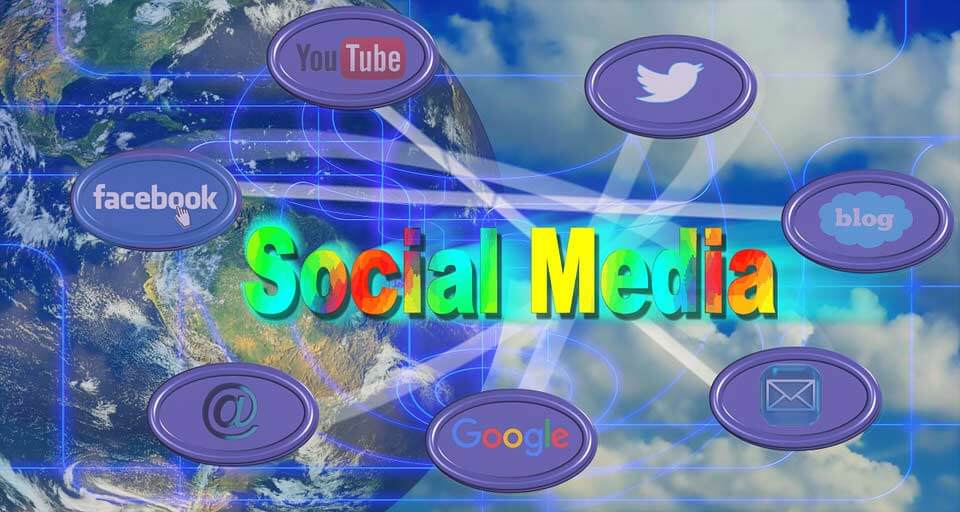
Introduction to Social Media For Recruiting
Social media for recruiting is a fascination forever individual nowadays. There would rarely be a person who isn’t using any social media channel daily. Social media has made life much easier.
A lot of things are happening through social media. Excluding the personal and social use of social media, there are other uses, like marketing on social media, increasing brand awareness, selling relevant content and blogs, etc. Nowadays,s social recruiting companies apply resources for offline marketing Managers and online marketing (social media marketing). Presently companies are using social media channels to social media for recruiting. You may have gone through many posts on social media channels offering job openings, and you may also have applied for them. Companies are mainly employing social media because of its cost-effectiveness and time-saving nature. Recruiters use social media as a cost-effective way to hire employees, among its multiple roles. LinkedIn, Facebook, and Twitter are on the top recruiters’ list for posting job vacancies advertisements. Social media for recruiting can be defined as an intersection of recruitment and social media.
A study found that 93% of companies use LinkedIn for social recruiting, 66% use Facebook, and 54% use Twitter. Jobvite- social media for recruiting software companies A survey report revealed that 73% of recruiters had hired candidates through social media channels, namely LinkedIn, Facebook, and twitter.93% of recruiters reviewed the candidate’s social media profile before making the hiring decision.
Through social media, hirers find it easier to review the candidate’s personal life, views, interests, and goals. Recruiters use these channels in the screening process to favorably select and unfavorably reject candidates for the job based on personality traits and interests.
1. LinkedIn
(representing 170 industries and 200 countries) is the channel that recruiters use to search for employees. It is a professional channel and is the most beneficial for recruiting candidates. Social recruiting through it consumes sometime in the start. Still, when the user has produced enough connections and networks in the later stages, it proves to be very beneficial for the company. Social recruiting companies agree that candidates’ social media for recruiting through LinkedIn are genuine and committed.
LinkedIn costs $195 to post a job advertisement for 30 days. The social media for recruiting can also sign up for “LinkedIn talent advantage”-an exclusive suite of tools for the hirers. Even if you don’t have the budget for these, you can use them in a cost-effective way using your network activity box(status box). Broadcast your message as “hiring”; for example, say-“looking for a digital marketer”. Another cost-effective way is to build connections with your friends, former employees, and professional acquaintances so that you can easily search for suitable candidates, either by yourself or from the referral of your connections.
2. Facebook
Companies use Facebook, with 400 million users, to hire employees cost-effectively. They join employment-related groups, post job requirements, and use Facebook Ads Manager. Candidates should share only necessary information, have an ideal profile, and avoid controversial topics in their posts. Employers may only accept candidates with spelling and grammar errors in their posts.
Facebook recruiting is cost-effective; recruiters can create a page free of cost to publicize their brand, posts, and labor requirements. Another easy and cost-effective way is to “join groups”. Some individuals form these groups to bring the employers and employees looking for a job posting on the same social recruiting platform. For example, there would be a Facebook group of “Jobs in digital marketing”. If you want to hire a digital marketer, you must join the group, post your ad and wait for the responses. If you want to save time while applying some money to the hiring process, you can indulge in “Facebook ads”. These ads are shown to the specific set of audiences you specify (Facebook asks what age, gender, sex, and qualification of individuals you require) and shows them your ad in their task pane whenever they browse their profiles.
3. Twitter
Most recruiters are also using it as a hiring channel. Companies may post job openings on their own account, like Citi Jobs, or use third-party companies to tweet their jobs. Candidates are advised to use their Twitter profile wisely and tweet accordingly. Remember, recruiters, look at your tweets to know your personality and interests. Hence, before using channels like Twitter, get a thorough knowledge of how to use them.
In order to recruit through Twitter, you have to increase your followers and build connections with specific people and organizations. You can conduct a quick search for keywords and hashtags; for example, search for” digital marketing” if you want to hire an individual in that field and conduct a search. Follow all the important companies, pages, and individuals who will help you form connections. While social media recruiting through Twitter, remember to use specific hashtags such as #hiring #jobs #recruitment #career #employees, etc., so that whenever individual searches for the jobs in the search box, the search results of tweets have those specific hashtags will be displayed.
Recruiters benefit from social media connections, such as employees, clients, and acquaintances, who can refer qualified candidates. Referrals lead to committed candidates and save time and resources for the recruiter, resulting in hiring the right people for the job.
Some social media for recruiting may not be willing to hire people through social media but do it due to “competition”. They may watch their competitors using social media channels as a part of the recruitment and may want to do the same to attract people to their company.
Social Media Recruitment Advantages And Disadvantages of the recruitment process
There are a lot of benefits to using social recruiting. These are-
Image source: pixabay.com-
Immediate response
Social media posts get an immediate response, particularly due to the ’share’ feature. Sharing the posts increases the reach of the posts and becomes available to be read by a large audience. When a large population reads it, the probability of immediate response increases and time is saved.
-
Lower costs
Hiring through social media channels costs much less than any other channel if you have full knowledge of how to use it. Posting in a Facebook group or Facebook page costs nothing. It saves a lot of resources for the company compared to the cost incurred for advertising with agencies, job boards, and referrals.
-
Fresh talent
The youth segment of society, especially college graduates, mostly use social media channels. Hence the company firm can choose from a pool of fresh talents with innovative ideas and skills.
-
Greater reach
Social media is being used across the world by a large number of people. Hence, everything that gets posted on them is read by a large population. If a job vacancy is posted on a social media channel using the right procedure, it reaches a lot of people, and hence the recruiter gets the benefit of choosing from a large pool of candidates.
-
More traffic
When you post a job opening on your page on Facebook, it automatically creates a lot of traffic to your page. Even if a large population is not selected for the job, they’ll keep visiting your site for further postings and blogs.
-
Personal touch
Social Recruiting helps you get in touch with the candidate socially so that you can go through the candidate’s profile, search for their interests, goals, etc, know their personality type, and decide whether the candidate’s personality is appropriate for the job and your company or not.
-
Access to passive candidates
Through social media, one can reach even those who are not searching for a job but have highly polished talents and skills. When these job opening posts reach this population, they might show interest even when they didn’t think to do that before.
Social Media Recruitment Advantages And Disadvantages of Recruiting
While social recruitment offers a large number of advantages, it also has some disadvantages that the user should be aware of so that he may be able to encounter any negative brand image.
Some of the disadvantages of Twitter, Facebook, and LinkedIn for social recruitment are-
- It is not easy to broadcast jobs effectively on Twitter. Twitter restricts you from using more than 140 words; hence, you may be unable to display what you want effectively. Some important details may not be included, which may entice the candidates.
- People have primarily used Facebook to talk and communicate with friends and family. Many individuals may be unwilling to indulge in professional activities like recruitment on Facebook. Also, they may not want to add their employers to their Facebook profiles as friends. Candidates discovered may not always be genuine, and the ‘privacy settings’ make it difficult to choose the right candidate.
- LinkedIn, though effective in recruitment, consumes a lot of time when users have to build relationships and networks to spread their word to many people. LinkedIn also restricts users from using more emails to contacts than the limit. This makes communication difficult. Employers also cannot send messages to individuals not connected with them. Another disadvantage is that LinkedIn has not reached the stage yet when it can be used globally for international recruitment.
Social Media Recruitment Advantages And Disadvantages to individuals can be as follows-
-
Fraud recruitment ads
Sometimes, individuals may fall prey to online scams when applying for and giving personal information to people not genuinely trying to recruit. These hackers may perform data and identity theft.
-
A lot of unnecessary online traffic
It may lead to unnecessary traffic, that is, traffic from those people who are either not willing to work seriously or do not fulfill the requirements. Screening these candidates take a lot of time and hence may reduce productivity.
-
Negative comments from rejected candidates
After receiving too many job applications on social media, it is natural to reject many individuals who do not fulfill the job requirements. Some individuals may become angry, spread a negative image of the company among their friends, and post negative comments about the company on various websites.
-
A disadvantage for economically weaker candidates
Some job seekers don’t use or don’t have access to social media. These people may include the economically weaker sections of society who don’t have the resources to reach social media. Not having access to social media can disadvantage individuals with valuable skills and the commitment to perform well.
Recommended
So here are some courses that will help you to get more detail about social media recruitment advantages and disadvantages and social media for recruiting, so just go through the link.



